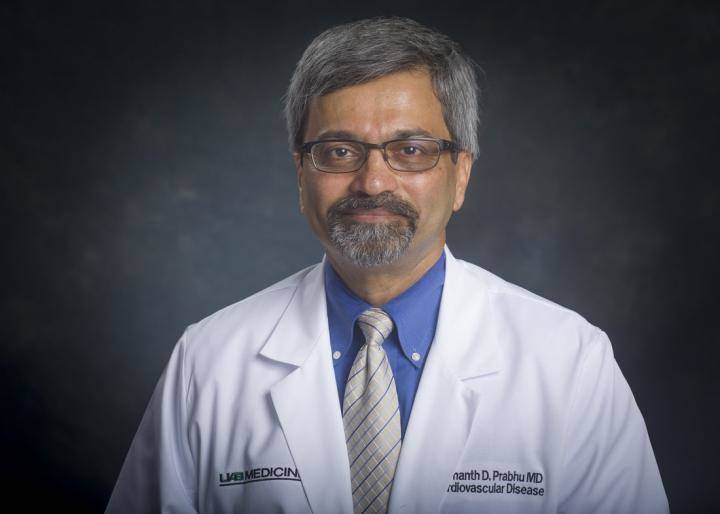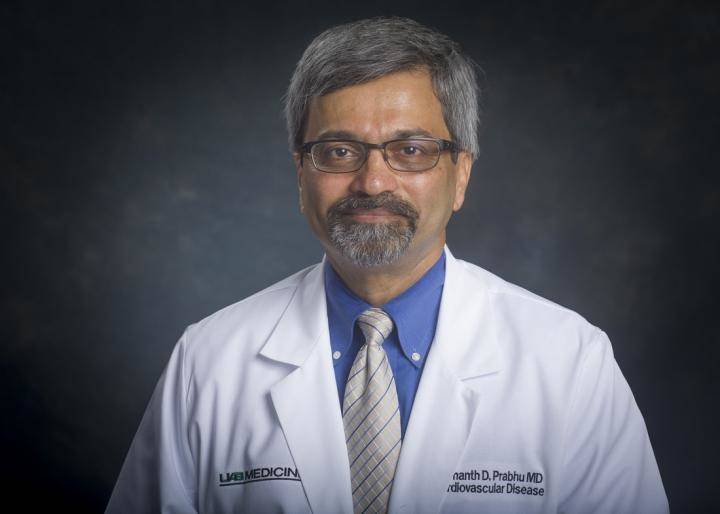
Credit: UAB
BIRMINGHAM, Ala. – University of Alabama at Birmingham researchers have identified a therapeutic target to prevent or delay heart failure from pressure overload of the heart, and a potential biomarker for the same. They say their animal studies carry clinical and translational potential.
In a study published in the journal JACC: Basic to Translational Science, Sumanth Prabhu, M.D., and colleagues found that preventing the early infiltration of CCR2+ macrophages into the heart, after experimental pressure overload in a mouse model, significantly lessened the heart's enlargement and reduced pumping ability that leads to later heart failure. Thus, this infiltration is a required step in the path toward heart failure.
Macrophages are immune cells that engulf and remove damaged or dead cells in response to tissue injury or infection. They also may present antigens to other immune cell types.
The most common forms of pressure overload are aortic stenosis — a narrowing of the aortic valve of the heart that forces the heart muscle to overwork — and high blood pressure. Aortic stenosis affects about one in 50 people over 65 years of age.
The UAB researchers used two different methods to prevent early macrophage infiltration — an inhibitor of the macrophage cell-surface CCR2 chemokine receptor, and an antibody that selectively removes CCR2+ macrophages. Migrating macrophages use the CCR2 receptor to home in on damaged tissues in the body that are releasing chemokines. Preventing early macrophage infiltration, Prabhu and colleagues say, may offer a therapeutic target in human disease.
Researchers had previously known that pressure-overload heart failure is associated with inflammation cause by activated T-cells. The present UAB study showed the link between infiltrating macrophages and the T-cell response during pressure overload of the heart.
Prabhu and colleagues found, one week after inducing pressure load, that the heart showed increased expression of three attractant chemokines that are able to bind to the CCR2 receptor on macrophages. They also found an increased number of monocytes with the cell-surface markers Ly6C and CCR2 circulating in the blood, and they saw an eightfold increase in CCR2+ macrophages infiltrating into the heart. Those macrophages are derived from the circulating monocytes.
The UAB researchers suggest that increased circulating monocytes might serve as an easily measurable biomarker that reflects cardiac tissue CCR2+ macrophage expansion. The circulating monocytes — along with other clinical, imaging and biochemical biomarkers — could guide patient selection for a prospective clinical trial to find out whether modulating CCR2 macrophages in humans with pressure-overload hypertrophy will delay or prevent later transition to heart failure.
In the JACC: Basic to Translational Science study, the Prabhu group found that blocking the infiltration of macrophages to the heart also suppressed infiltration of inflammatory T-cells into the heart and T-cell expansion in the lymph nodes that drain from the heart.
"Taken together, these data indicate that blood monocyte-derived macrophages infiltrating the heart early after pressure overload are indispensable for the sustained T-cell activation that underlies remodeling progression and the transition to heart failure," the researchers concluded.
###
At UAB, Prabhu is the Mary Gertrude Waters Chair of Cardiovascular Medicine, and he directs the Division of Cardiovascular Disease, Department of Medicine and the Comprehensive Cardiovascular Center. He is also on the medical service of the Birmingham Veterans Affairs Medical Center, Birmingham, Alabama.
Co-authors with Prabhu on the paper, "CCR2+ monocyte-derived infiltrating macrophages are required for adverse cardiac remodeling during pressure overload," are Bindiya Patel, Ph.D., Shyam S. Bansal, Ph.D., Mohamed Ameen Ismahil, Ph.D., Tariq Hamid, Ph.D., and Gregg Rokosh, Ph.D., UAB Department of Medicine, Division of Cardiovascular Disease, and Comprehensive Cardiovascular Center; and Matthias Mack, M.D., University Hospital Regensburg, Regensburg, Germany.
Funding for this work came from National Institutes of Health grant HL125735 and Veterans Affairs Merit Award I01BX002706.
Media Contact
Jeff Hansen
[email protected]
205-209-2355
http://www.uab.edu
Original Source
https://www.uab.edu/news/research/item/9251-immune-cell-target-identified-that-may-prevent-or-delay-heart-failure-after-pressure-overload http://dx.doi.org/10.1016/j.jacbts.2017.12.006





